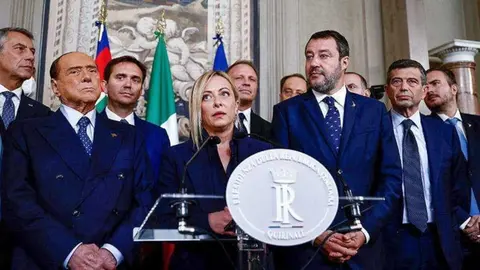Is the Meloni government beginning to suffer from the wear and tear of power?

Marco Bucci was running in these elections with the achievement, as mayor of Genoa, of having had a new bridge built in the area where the so-called ‘Ponte Morandi’ fell six years ago, while Orlando is one of the historic leaders of the Democratic Party (PD), with which he has been Minister of Justice on three occasions and, with the Mario Draghi government, head of the Labour portfolio.
With a low turnout (not helped by the very adverse weather conditions), Bucci won by just over 8,000 votes over Orlando: the 291,000 votes his candidacy received accounted for 48.77% of the votes cast, while Orlando's more than 282,000 votes were 47.36%. From this point on, there are many readings that can be made.
The most important is, clearly, the overwhelming victory of Ely Schlein over the Roman and President of the Council of Ministers Giorgia Meloni: while the young centre-left leader took 28.47% of the votes, the Roman politician was left with a poor 15.08%, saved by the 9.46% received by the list of ‘Bucci presidente Vince Liguria’, the 8.47% of Mateo Salvini's Lega and the 7.98% of Antonio Tajani's Forza Italia. In other words, compared to last June's European elections, Schlein has been able to gain almost 5 more points of support, while Meloni has lost no less than 14.
With Schlein leading the centre-left and Meloni doing the same for the centre-right, why didn't former minister Andrea Orlando win? Basically, for two fundamental reasons: the division of the centre-left, which did not allow Matteo Renzi's Italia Viva to form part of the list (but did allow the Azione de Calenda, which won a paltry 1.75% of the vote) due to an immovable demand from the Five Star Movement. A Five Star Movement which, by the way, has made its umpteenth ridiculous showing: the 4.56% of the votes it has received is a third of what it received in the last general election (held in September 2022).
And, as has already been said on previous occasions, it is not clear what Five Star is at the moment: with its main leaders retired from politics (Di Maio, Fico, Toninelli), its attempt to reconvert itself into a left-wing party is simply not feasible. Because either you vote for a moderate left (which is where the Schlein party is leading) like the PD, or you vote for a radical left (Green and Left Alliance), but Five Star is neither one nor the other. And so it goes.
In a few months it will be Renzi's turn to integrate his party into the centre-left coalition that will run for the government of Emilia-Romagna, a ‘rossa’ region where the centre-left has governed since 2014 and where the best Salvini failed, with 43% of the vote in January 2020, to win the government for the centre-right. Here it will be difficult to see Five Star in the centre-left coalition, as in the last two legislatures it has been in opposition to the PD in this territory and this has placed it in the opposition. So in Emilia-Romagna what will be seen is whether Renzi is as politically liquidated as Five Star, but what is already clear is that the ‘anti-politics’ party is not here to veto any formation: surely, once this legislature ends (which could last until September 2027), it will sign its death certificate, since it no longer has any sense of existing. It has been more than proven that without its famous ‘citizenship income’, Five Star has neither identity, nor territorial implantation, and even less politicians of any worth.
On the other hand, although the moment to measure whether there is a change of political cycle will not take place for another year (when the governments of Valle d'Aosta, Tuscany, Campania, Puglia and Veneto are renewed), we may be witnessing the beginning of the fall in popularity of the Roman Meloni. After having surpassed the important figure of 30% of voting intentions in July this year (30.4% for Ipsos, the main ‘sondaggista’ company), Meloni's formation (Brothers of Italy) has fallen to 26.8%, with Tajani's Forza Italia retaining part of its vote and Salvini's Lega remaining stable.
Schlein, on the other hand, has risen from 19 to 21% in the same period, and the centre-left now has about 47% of the vote, compared to 45% for the centre-right. What is the centre-left's problem in not ousting Meloni from the centre-right? Firstly, the centre-right far outnumbers the centre-left in parliamentary terms (120 senators to the centre-left's 80). And secondly, the tremendous division within the centre-left: Alianza Verde and Izquierda, as well as the Five Star Movement, have vetoed Renzi and his supporters, despite the fact that Schlein has been clamouring for months for unity on the centre-left. Renzi warned last August that a possible centre-left coalition was ‘very difficult’, but that it had to be tried: today it does not seem feasible.
But the most important reality of all is the current electoral law: the ‘Rosattellum bis’ (October 2017) favours coalitions over parties standing alone. Beyond the public clashes between Salvini and Tajani, the centre-right parties unite in a single coalition (which they have done on many occasions, the last two in 2018 and 2022), while the centre-left parties tend to split. What is certain is that either the centre-left overcomes mutual vetoes, or the centre-right will govern again in the next legislature.
A final thought: what is the reason for the evident decline of the until recently very popular Meloni? Quite simply because the economic situation and public finances are deteriorating. In the two years that the Meloni government has been in office, each Italian has seen his or her individual debt increase by 2,000 euros (from 46,000 to 48,000 euros), and growth is decreasing: from 8.3% in 2021 to 3.6% in 2022 and 0.9% in 2023. And the estimates of the Ministry of Economy and Finance (headed by the lawyer Giorgetti, a man completely alien to the economic world but the only one who agreed to lead this portfolio) estimate a maximum of 0.5% growth in Gross Domestic Product (GDP) for this year 2024.
Meloni faces a very serious problem: the return to the Stability Pact, with its famous 60% debt to GDP and 3% deficit, clashes with public accounts that are increasingly weighed down by an ageing country, with monstrous spending on pensions (around 330 billion) and with the generations of new talent in Italy leaving for other countries due to the low salaries paid in the eurozone's third largest economy.
The president of the Council of Ministers would love to take on the EU authorities, but the 209 billion they received in 2020, to be distributed over the 2021-27 seven-year period, leaves her with no room for defiance towards a European Commission where her best man, Raffaelle Fitto, is no more than vice-president (a status he shares with five other people). The European Central Bank is in the hands of the French (Christine Lagarde is its president), and the International Monetary Fund (IMF) is led by Bulgaria's Georgieva. So, the Roman Meloni has no one to support her within the European Union, at least among the most relevant countries.
On 15 October, the preliminary draft budget was presented, which now has to pass the ‘go-ahead’ of the Commissioner for Economic Affairs before being definitively approved by the Italian Parliament in the second half of December. Many people are not familiar with the public accounts, but, like the French and Belgian ones (the other major European economies that have been penalised months ago for deficit infringement), they have two fundamental characteristics: a substantial tax increase and a sharp reduction in public spending.
Do you know how high the transalpine risk premium is these weeks? It is barely over 120 basis points. This means that the once ‘Eurosceptic’ Meloni, like so many others before her, has given in completely to the ‘troika’ (International Monetary Fund, European Central Bank and European Commission) and has fully accepted the ‘road map’ set by the main economic organisations and those that have part of the money that the Meloni government needs to carry out its policies (yes, now it is going to finance birth rate policies after two years of thinking about it).
It is to be expected that, after the US elections (to be held on 5 November) and the foreseeable end of the war in Ukraine, the economies of the western world will improve due to an expected drop in prices. But this does not mean that Meloni is any less like the Matteo Renzi of 2016. Renzi ended up at home after losing the ‘constitutional referendum’, lasting 1,020 days as president of the Council of Ministers. Will Meloni be able to surpass him? Probably yes. By much more? Probably not. Will she run out the term of office? She will try, but at the rate he is going it seems a real pipe dream. And what has happened in Liguria, where he has gone to 15% of the votes, seems to be a full-fledged warning. We will see what will happen in the coming months, although it seems clear that we have a centre-right that is increasingly on the defensive.
Pablo Martín de Santa Olalla Saludes is Professor at Camilo José Cela University (UCJC) and author of the book Italia, 2018-2023. De la esperanza a la desafección (Madrid, Liber Factory, 2023).





